Suchergebnisse für "Factsheet: Energietechnologien gestalten, die für alle sinnvoll und nutzbar sind"
Optimization in Existing Structures - Implementation Concept for Energy Optimization in the Existing District of Nofels in Feldkirch
The project aims to optimize energy use in the district through savings, densification, retrofitting, and energy storage. Additionally, climate-adapted open spaces are intended to enhance quality of life and resilience. The results will be scaled up to the entire city and make a significant contribution to achieving climate neutrality.
MEIDLINGER L Demo
The MEIDLINGER L modular rank shelf system is intended to enable the widespread use of façade greening in existing urban areas. In combination with thermal refurbishment of existing buildings as well as greening, PV, water management, conversion of street space and mobility with the integration of resilient energy infrastructure as well as the application of a customized financing model and a service offer for multiplicability.
Wärme aus der Tiefe
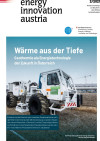
Geothermie als Energietechnologie der Zukunft in Österreich
energy innovation austria
2/2021
Herausgeber: BMK und Klima- und Energiefonds
Deutsch, 12 Seiten
Downloads zur Publikation
Der städtische Untergrund als Rohstoffmine? Potential an Sekundärressourcen in der erdverlegten Infrastruktur
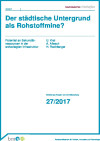
Machbarkeit eines Ressourcenkatasters zur Inventarisierung, Charakterisierung und Verortung der Materialbestände in den erdverlegten Infrastrukturnetzwerken österreichischer Stadtregionen. Das Ergebnis dient der ökonomischen Bewertung von Sekundärrohstoffpotenzialen.
Schriftenreihe
27/2017
U. Kral, A. Allesch, H. Rechberger
Deutsch, 73 Seiten
Downloads zur Publikation
Eröffnung Palettenhaus
25. April 2017
Wiener Neudorf
Das Projekt war im Jahr 2007 als Sieger aus dem europäischen Studierendenwettbewerb GAU:DI hervor gegangen. Nun wurde das Palettenhaus in der Blauen Lagune in Wiener Neudorf eröffnet.
THERM-opti-BALKON-P2 - Thermisch optimierte Balkonsanierung Phase 2: In-Situ-Versuchsanlage
Bei der thermischen Sanierung von Gebäuden stellen frei auskragende Balkone ein besonderes Problem dar. Mit dem THERM-opti-BALKON-System wird derzeit unter Laborbedingungen ein diesbezüglicher Lösungsansatz erforscht. Phase 2 soll eine In-Situ-Versuchsanlage unter realen Bedingungen als Technologiedemonstrator schaffen. Wichtigster Untersuchungsgegenstand ist das Langzeitverhalten des THERM-opti-BALKON-Systems.
ECEE Climate Positivity
The ECEE Climate Positivity project aims to develop a climate-positive, scalable energy concept for commercial buildings. Through the innovative combination of building-integrated photovoltaics, component activation, and intelligent energy management, the project seeks to reduce CO₂ emissions, lower operating costs, and establish new business models for sustainable construction.
KliB40-Climate Compass: Climate-neutral Bregenz 2040, climate compass for the structured participation of stakeholders and the citizens
The "KliB40 Climate Compass" supports Bregenz on its path to climate neutrality by 2040 through transparent development, selection, and monitoring of measures. It facilitates the coordination of climate protection activities and actively involves stakeholders. By evaluating existing software solutions, the project ensures optimal digital support for planning and implementing the city's climate strategy.
Bioenergie im Energiesystem der Zukunft
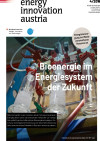
Energieversorgung auf Basis erneuerbarer Ressourcen.
energy innovation austria
4/2019
Herausgeber: BMVIT und Klima- und Energiefonds
Deutsch, 12 Seiten
Downloads zur Publikation
crowd2raum - Participatory co-financing models for socially innovative and sustainable reactivation for vacancies
As part of the exploratory project "crowd2raum", existing funding and support programmes are being combined with existing crowdfunding mechanisms (imGrätzl.at/WeLocally.at platform) to create a co-financing model for vacancy activation. This will be developed and tested in practice through the activation of four vacant spaces in the base zone in the defined pilot areas in Vienna and Graz.
ELEMENTS - Development of a procedure for the evaluation of elements of the post-war building stock (1960 - 1979) in Graz, Austria
Investigation of the building stock constructed in Graz between 1960 and 1980 with the aim of creating the basis for developing a potential analysis procedure regarding its preservation and refurbishment. Stakeholders, including those from the fields of planning and building practice, will be involved in the development of the results.
In der Praxis angekommen: Fallbeispiele zu Building Information Modeling (BIM) entlang des gesamten Lebenszyklus eines Gebäudes
11. Oktober 2018
COOL MAMA Hotel Salzburg, Josef-Brandstätter-Straße 1, 5020 Salzburg, AT
Im Rahmen der Veranstaltung werden anhand von mehreren Fallbeispielen Building Information Modeling (BIM) Projekte entlang des gesamten Lebenszyklus eines Gebäudes präsentiert. Weiters werden rechtliche Aspekte einer BIM Ausschreibung thematisiert.
Vitality City - Holistic energy strategies for cities in transition
Energy simulation of any size city (municipalities) based on the data from laser scanning and satellite analysis (Geodata) to obtain dynamical energy demands and available energy resources.
#EEG++ Digital Energy Communities Optimized
The project aims to develop an innovative energy system for plus-energy neighborhoods by integrating advanced photovoltaic installations, IoT technology, and energy communities to maximize the self-consumption of renewable energy while ensuring economic efficiency and user-centricity.
Photovoltaik im Energiesystem der Zukunft
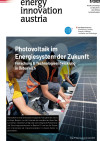
Forschung & Technologieentwicklung in Österreich
energy innovation austria
3/2021
Herausgeber: BMK und Klima- und Energiefonds
Deutsch, 12 Seiten
Downloads zur Publikation
HEATbucket - Urban underground thermal energy storages to enable energy transition
In urban areas, the heat supply and cooling of buildings is one of the key challenges in the course of the energy transition. With HEATbucket, a structural engineering solution is to be investigated for the realisation of underground heat storage in built-up areas. In addition to the technical challenges, the focus is on the general feasibility and the impact on the subsoil and groundwater.
Co-Housing Gutenberg: Integrated Sector Coupling for Shared Living, Energy, and Mobility
The "CoHoGutenberg" project aims to establish a sustainable co-housing model in the rural community of Gutenberg, Styria, by combining sufficiency principles with state-of-the-art energy technologies.
DREI x NULL = NULL - Research project on climate-neutral construction in all life cycle phases based on three demonstration buildings
The aim of the F&E project is the realization of three different residential buildings, which are all climate-neutral in the life cycle phases of construction, operation and dismantling. The aim is to create exemplary showcase projects for the future residential construction sector.
ReBuildStock - Portfolio-Management zur Dekarbonisierung großer Wohnungsbestände
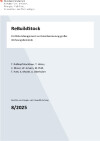
Portfolio-Managementmethode zur Unterstützung der Entscheidungsprozesse von Eigentümer:innen größerer Wohnungsbestände bei der Erarbeitung von Strategien zur schnellen und sozialverträglichen Dekarbonisierung ihrer Gebäudebestände.
Schriftenreihe
8/2025
T. Roßkopf-Nachbaur, T. Weiss, C. Moser, W. Amann, M. Ploß, T. Hatt, A. Mundt, A. Oberhuber
Herausgeber: BMK
Deutsch, 115 Seiten
Downloads zur Publikation
CircularBioMaterials
ParaStruct GmbH explores the technical and economic possibilities of recyclable, mineral-bound biomaterials in the project. The result is a basis for further development work and investments in this area.
